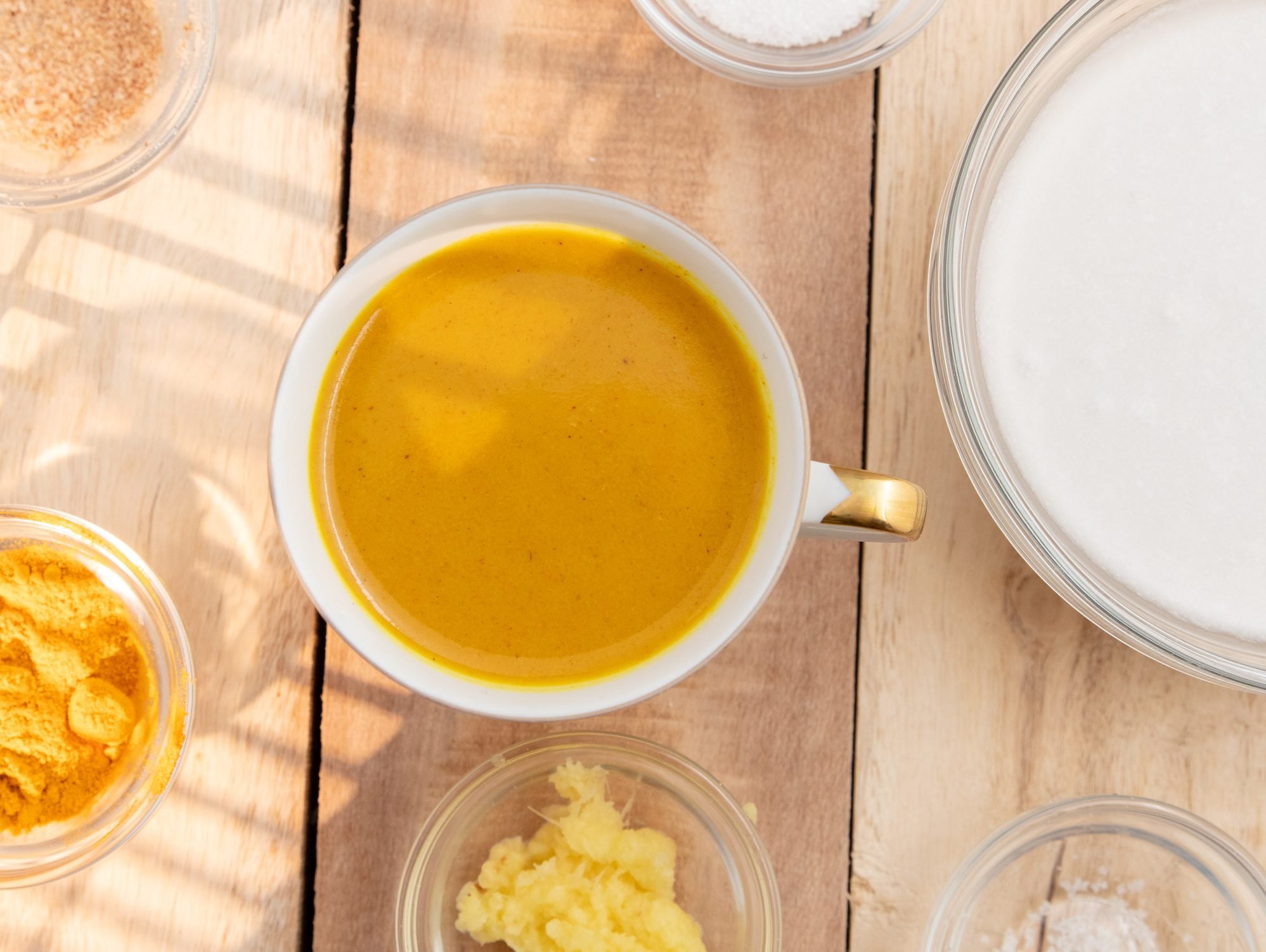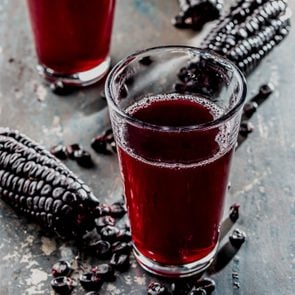5 Reasons Turmeric Coffee Might Be Good for You—and How to Make It
Updated: Jun. 08, 2021
Turmeric, known as the golden spice, can enhance the flavor of your coffee, but can it help your health? Here are the potential benefits, plus how to make your own golden latte and turmeric coffee at home.
What’s a golden milk latte?
Imagine starting your day with a mug of creamy, gold-hued latte. Inhale the gingery aroma and take a sip of the startlingly spicy, complex flavors of turmeric and coffee beans.
If this sounds like your kind of cuppa, order a trendy golden milk latte with a shot of espresso next time you visit your local coffee shop. Better yet, whip up your own with our experts’ recipes (one is sans coffee). It’s easy to find quality turmeric at the supermarket since the spice’s sales have more than doubled since 2014, according to market research company Statista.
(Or, you may prefer this nutritionist-approved pumpkin spice latte recipe.)
This warm beverage hails from India, where turmeric has been used as a health boost and natural remedy for centuries. The drink—you’ll hear it called turmeric coffee, a golden latte, or a golden milk latte—doesn’t always involve coffee. Rather, hot golden milk includes heated cow’s milk or plant-based milk with turmeric, cinnamon, and ginger.
What’s turmeric?
Turmeric, the golden spice used liberally as a colorant and peppery kick in Indian cuisine, has been touted as a digestive aid for centuries.
“Turmeric has many beneficial anti-inflammatory compounds, specifically curcuminoids, or curcumin, which have been found to fend off inflammation and keep the heart and brain healthy, too,” says registered dietitian nutritionist Vicki Shanta Retelny, RDN, a culinary consultant and host of Nourishing Notes.
There are thousands of peer-reviewed studies on turmeric’s health benefits, including heartburn relief and glowing skin. However, eating or drinking curcumin does not always guarantee health improvements. It must be ingested in a way that your body can easily absorb.
Combining turmeric and coffee
There are indications that coffee could diminish turmeric’s health benefits, though the fat in some golden lattes could help your body absorb more curcumin. Both turmeric and coffee also offer loads of antioxidants.
How coffee affects the absorption of curcumin
A 2020 study published in the journal Molecules suggests curcumin absorption is improved when combined with fat and liquid with a pH level of 6 or higher: The lower a pH number, the more acidic a substance is, and coffee comes in around pH 5. However, lattes containing whole milk or fatty plant-based milk could balance the acidity of the coffee and improve your chances of absorbing turmeric’s health-boosting curcumin.
What’s more, coffee offers health perks of its own, according to Shanta Retelny. (Here are some surprising health benefits of coffee to know.)
“Coffee beans have a variety of health benefits, as they contain over 1,000 bioactive compounds,” she says. “Coffee also contains antioxidants that can keep cells healthy, and coffee has been shown to fend off type 2 diabetes and heart disease, as well as increase longevity.”
Antioxidants in turmeric and coffee
Mixing up a turmeric latte might diminish some of turmeric’s benefits, but it’s still an antioxidant-rich, low-calorie way to start your day. Shanta Retelny says that turmeric and coffee might have different types of antioxidant compounds, which could mean the combination is more beneficial than either ingredient alone.
“Research has shown that turmeric’s antioxidants can activate antioxidant enzymes in the body to offer internal protection, too,” she adds.

The potential health benefits of drinking turmeric coffee
The idea of adding turmeric to coffee is a fairly new trend. There is individual research on turmeric and coffee, but no data of its potential health benefits as a concoction. However, the combination of turmeric and coffee together could offer a potent drink. Here’s the scientific data so far on the golden spice.
May calm inflammation
Research shows that turmeric can reduce inflammation related to several health conditions, including rheumatoid arthritis.
Turmeric lattes often include ginger and cinnamon, two spices that some research suggests can also tamp down inflammation. The combination may help soothe the pain and redness related to joint inflammation.
(Find out whether coffee causes inflammation.)
May improve your mood
If you’re a regular coffee drinker, your morning cup of joe might already feel like a warm, comforting ritual. Add the potential antidepressant activity of curcumin to the energizing jolt of caffeine, and you’ve got a beverage that could lift your mood.
(This is what happens to your body when you drink coffee every day.)
May help with blood sugar
Research published in the Journal of Nutrition & Intermediary Metabolism in 2018 suggests that curcumin may help people with type 2 diabetes manage their blood sugar. Blood sugar control is critical for preventing complications from diabetes, including heart and kidney diseases, nerve damage, and vision deterioration.
Of course, all bets are off if you add too much sugar or honey to your golden latte. In fact, a latte that’s too carb-heavy could end up raising blood sugar. (Here are natural sweeteners that are better for you than sugar.)
May ease digestive woes
A 2018 research review published in the Journal of Clinical Medicine suggests that turmeric may relieve stomach discomfort from irritable bowel syndrome (IBS). These symptoms include diarrhea bloating, or painful stomach cramps. But, the researchers note, the benefit was small and the findings based on limited evidence.
A small study published in Clinical Gastroenterology and Hepatology suggests that adding curcumin to the prescription treatment for ulcerative colitis can help soothe symptoms.
May lower heart disease risk
Though many factors—including genetic ones—can contribute to heart disease, inflammation can also be a trigger—and turmeric coffee packs an anti-inflammatory punch.
A 2020 study published in Biotechnology Advances indicates that curcumin’s anti-inflammatory power—along with ingredients such as cinnamon and ginger—could help with some of the risk factors for cardiovascular disease, including cholesterol and blood pressure. Just keep in mind that a lot of lifestyle habits contribute to heart disease, and managing your alcohol and tobacco consumption, stress, obesity, and activity levels will have a greater impact o your risk.
Turmeric coffee isn’t a cure-all
It’s important to remember that turmeric lattes are not well-researched. Potential perks, like a better mood or reduced pain, might be possible, but sprinkling spices into your morning java is no substitute for medical treatment.
“Turmeric coffee is not an elixir by any means,” says Shanta Retelny. “It’s another way to get some turmeric into the diet, but adding turmeric to your culinary endeavors may not be enough as a therapeutic dose.”
She cautions against relying on turmeric coffee as a cure-all, adding that turmeric coffee can be a great treat if your diet is already full of vegetables, fruits, whole grains, lean proteins, and healthy fats.
In addition, turmeric coffee still contains caffeine. Shanta Retelny says, “Overdoing coffee or any caffeinated beverage may cause irritability, lack of focus, heartbeat irregularities, and poor sleep. It’s best to be moderate with any coffee beverage.”
(Here are the signs you’re drinking too much coffee.)
Homemade golden latte recipe
“Turmeric-infused drinks are growing in popularity due to the awareness of its health benefits,” says board-certified naturopathic doctor Olivia Audrey, ND. She recommends adding it into your daily eating and drinking routine in whatever ways are enjoyable for you. Here’s her turmeric recipe, sans coffee.
Ingredients
8 ounces coconut milk
Stevia or honey to taste
Turmeric to taste (anywhere from a pinch to ½ teaspoon)
Dash of cinnamon
Directions
In a small saucepan over medium heat, combine all ingredients. Stir until warmed to an ideal drinking temperature. Remove from heat and froth (this can be done with a steam wand, milk frother, or even a small whisk) to your liking, and pour into a mug.
Homemade turmeric coffee recipe
“It’s simple to make turmeric coffee—you can also buy blends with turmeric in the coffee grounds already from Starbucks,” says Shanta Retelny. Here’s her favorite turmeric coffee recipe.
Ingredients
1/2 cup dairy or plant-based milk
1 teaspoon ground turmeric
1/2 teaspoon ground cinnamon
1/4 teaspoon ground ginger
Pinch of black pepper
8 ounces brewed coffee
1 teaspoon pure maple syrup (optional)
Directions
In a small saucepan over medium heat, stir together milk, turmeric, cinnamon, ginger, pepper, and coffee. Briskly blend with an immersion blender or whisk. For sweetened coffee, add maple syrup. Pour into a coffee mug and enjoy.
Next, try this protein-rich coffee smoothie recipe.




